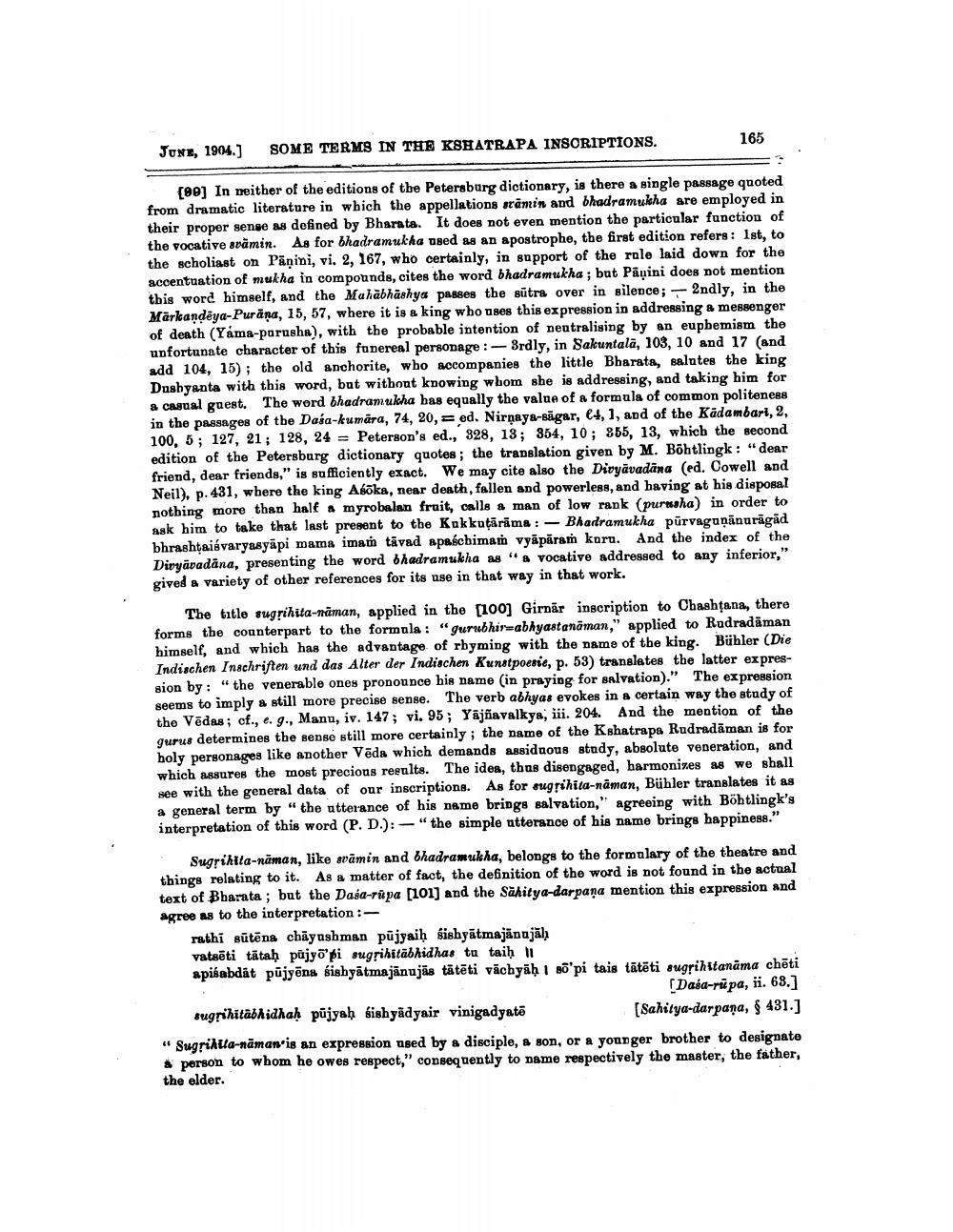________________
JUNE, 1904.)
SOME TERMS IN THB KSHATRAPA INSCRIPTIONS.
165
[90] In neither of the editions of the Petersburg dictionary, is there a single passage quoted from dramatic literature in which the appellations srāmin and bhadramukha are employed in their proper sense as defined by Bharata. It does not even mention the particular function of the vocative svamin. As for bhadramukha used as an apostrophe, the first edition refers : Ist, to the scholiast on Pāņini, vi. 2, 167, who certainly, in support of the role laid down for the accentuation of mukha in compounds, cites the word bhadramukha ; but Pāṇini does not mention this word himself, and the Mahābhāshya passes the sūtra over in silence; - 2ndly, in the Märkandēya-Purana, 15, 57, where it is a king who uses this expression in addressing a messenger of death (Yama-parusha), with the probable intention of neutralising by an euphemism the unfortunate character of this funereal personage :- Srdly, in Sakuntalā, 103, 10 and 17 (and ada 104, 15); the old anchorite, who sccompanies the little Bharata, salutes the king Dushyanta with this word, but without knowing whom she is addressing, and taking him for a casual guest. The word bhadramukha has equally the value of a formula of common politeness in the passages of the Dasa-kumara, 74, 20, ed. Nirnaya-sägar, 84, 1, and of the Kadambari, 2, 100, 5; 127, 21; 128, 24 = Peterson's ed., 328, 13; 354, 10; 855, 13, which the second edition of the Petersburg dictionary quotes; the translation given by M. Böhtlingk: "dear friend, dear friends," is sufficiently exact. We may cite also the Diryävadāna (ed. Cowell and Neil), p. 431, where the king Asöka, near death, fallen and powerless, and having at his disposal nothing more than half a myrobalan fruit, calls a man of low rank (purusha) in order to ask him to take that last present to the Kukkuţārama :- Bhadramukha pūrvaguņānurägäd bhrashtai varyasyapi mama imam tāvad apsécbimam vyāpāram koru. And the index of the Divyavadana, presenting the word bhadramukha as "& vocative addressed to any inferior," gived a variety of other references for its use in that way in that work.
The title sugrihita-naman, applied in the [100] Girnår inscription to Chashtana, there forms the counterpart to the formula : "gurubhir=abhyastanaman," applied to Rudradāman himself, and which has the advantage of rhyming with the name of the king. Bühler (Die Indischen Inschriften und das Alter der Indischen Kunstpoesie, p. 53) translates the latter expression by : “the venerable ones pronounce his name (in praying for salvation)." The expression seems to imply & still more precise sense. The verb abhyas evokes in a certain way the study of the Vēdas; cf., e.., Manu, iv. 147; vi. 95; Yājñavalkya, iii. 204. And the mention of the gurus determines the sense still more certainly; the name of the Kshatrapa Rudradāman is for holy personages like another Vēda which demands assiduous study, absolute veneration, and which assures the most precious results. The idea, thas disengaged, harmonizes as we shall see with the general data of our inscription. As for sugrihita-naman, Bühler translates it as a general term by " the utterance of his name brings salvation," agreeing with Böhtlingk's interpretation of this word (P. D.): - "the simple utterance of his name brings happiness."
Sugrihita-naman, like srāmin and bhadramukha, belongs to the formulary of the theatre and things relating to it. As a matter of fact, the definition of the word is not found in the actual text of Bharata ; but the Dasa-rūpa [101) and the Sahitya-darpaņa mention this expression and agree as to the interpretation :
rathi sūtēna chāyushman pujyaih sishyātmajānajāh vatsēti tätaḥ pujyo'pi sugrihitäbhidhas tu taih 11 apiśabdát püjyöna sishyatmajānujās tātēti vāchyah Bo'pi tais tātēti sugrihitanāma chēti
[Daša-rupa, ii. 68.] sugrikitabhidhah pūjyah sishyadyair vinigadyatē
[Sahitya-darpana, 431.] "Sugrikula-naman is an expression used by a disciple, a son, or a younger brother to designate & person to whom he owes respect," consequently to name respectively the master, the father, the elder.




